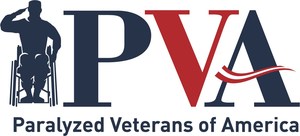
Paralyzed Veterans Executive Director Highlights VA Staffing Needs, Privatization and Title 38 in Strong Remarks to More than 800 Attendees at 2016 Healthcare Summit
WASHINGTON, Aug. 31, 2016 /PRNewswire/ -- During his opening remarks on the second day of Paralyzed Veterans of America's (Paralyzed Veterans) 2016 Summit and Expo, Paralyzed Veterans' Executive Director (ED) Sherman Gillums, Jr. spoke to the 840 doctors, nurses, physical therapists and other VA health care providers in attendance. He spoke to the audience not from his perspective as the head of a national veterans service organization, but as a veteran—a paralyzed veteran, who relies on the VA spinal cord injury and disease system of care.
In his remarks ED Gillums stated:
"…Today I'm speaking for the men and women who have no voice but scream in vain to be heard. [These] will be candid reflections as we sit here facing uncertainty about the future of a system of care that unites us here at the health summit.
When it comes to veterans, here's the question we should be asking ourselves where the government is concerned: who are the beneficiaries of the sacrifices that service members make when they volunteer to defend the country, as they return from combat with severe wounds both visible and invisible? Whether injured during or after service? As they face suicide, stigmatization, and increasing cynicism and apathy?
The beneficiaries of that risk and sacrifice were you, taxpaying citizens. It is the taxpayers who are responsible for ensuring our government meets its obligations. This includes the obligation to care for the 22 million veterans who live in the US today, 9 million of whom are enrolled in VA health care.
So when I hear talk of privatizing VA health care, the first thing I think about is that obligation and whether one can outsource the responsibilities that come with the benefit of being free and protected at virtually little cost to most of society. A privatized healthcare system will not be subject to Title 38 protections, such as due process for veterans in clinical appeals and medical malpractice cases, regulatory oversight by Congress, and accredited representation by veteran service organizations. These all go away in a privatized system.
Privatizing VA is the opposite of choice. Instead of 'Choice Care' it should be called 'Chance Care,' because that's exactly what it will be: Fragmented, less coordinated, non-veteran centric — yet convenient.
Last year, SCI nurses performed more than 105 thousand hours of overtime due to turnover and understaffing because staffing models lagged behind patient need by about 15 years. The uniquely complex and taxing nature of spinal cord injury bedside care is different from urgent care, ICU, and other specialities because aging paralyzed veterans have complex, individualized medical needs, and rely on coordinated multidisciplinary services to address their problems. Patient need went up as staffing plateaued.
Yet, I still get asked by senior VA leaders, 'But what about all the empty beds? Can you prove this unmet demand or long wait times?' Those of you in the field, who touch the patients and directly administer the care know the answer. Empty beds at spinal cord injury centers are not due to a lack of demand. Empty beds are due to a lack of staff to operate those beds once the census gets capped at your facilities. This is precisely why average daily census does not tell the whole story and cannot be a factor in future staffing models.
Here's the inescapable reality: There are an estimated 42,000 veterans with SCI in the U.S., 26,000 of which are eligible for VA care, but only 12,000 are receiving specialized care. That doesn't include those with spinal cord diseases. Our members aren't simply opting to go somewhere else for care, or deciding they don't need comprehensive exams or specialized acute care. They're either waiting to get in, are uninformed about their VA option, underestimate the importance of specialized preventative care, or have decided the fight isn't worth it and simply have settled for less.
While I argue that VA is the best and only option, it comes with a duty on your part as spinal cord injury and disease professionals as well. A duty to, in fact, reflect the excellence that Paralyzed Veterans talks about when defending the SCI system of care, starting at the top… to bring stability to the service line, to champion the highest standards in accordance with VHA policy, and to advocate for badly needed resources.
[A few last points in closing…]
- Staffing to the minimum number required is wrong. It's your job to ensure your centers are staffed to meet actual demand, the real demand, which includes those to whom you need to reach out and educate on available services and the benefits of annual exam.
- Debate will continue on how we can best improve the access to and quality of VA health care, mostly between people who don't use VA, work in VA, or rely on it for health care. Some have made it their mission to eradicate VA health care in the name of ideology and potential profits. They claim VA is a failed enterprise and are doing anything and everything to bring about its demise ....they talk about privatizing VA without discussing a viable alternative for SCI care once VA disappears. Without discussing the consequences of removing Title 38 protections for veterans who won't have those protections in the private sector. Without discussing Congress's diminished oversight role as private sector providers operate with relative impunity.
- I urge you not to reinforce their cynicism by taking the path of least resistance ... The paralyzed veterans you care for aren't nameless, faceless statistics … They are human beings. They are the reason you have a purpose. The reason Paralyzed Veterans of America will stand our ground.
In conclusion, ED Gillums thanked the health care providers directly, stating: 'Thank you, all of you in the trenches, who get your hands dirty and do the grunt work. No matter how thankless it seems or how isolated you feel, I'm here to assure you, it matters.'"
The packed room rose to their feet in thundering applause as ED Gillums left the podium. Under Secretary Dr. David Shulkin followed ED Gillums with an overview on the current initiatives of the Department of Veterans Affairs.
| CONTACT: |
Lani Poblete |
| 202-416-7667 |
Photo - http://photos.prnewswire.com/prnh/20160831/403203
SOURCE Paralyzed Veterans of America







Share this article